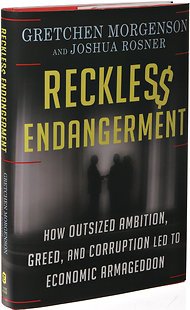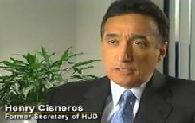MARTINSVILLE, Va., Sept. 27 — In a tightknit neighborhood, where people’s social lives often revolve around their churches, Beulah Penn and her daughter, Sharon, were well-connected and trusted. Beulah Penn was a lay minister in a local church; her daughter, Sharon Penn, dressed hair.
Using these connections, according to a recent lawsuit, the two women and another relative in Indianapolis perpetrated one of the largest mortgage frauds in American history, victimizing dozens of local residents and, according to sources with knowledge of the accusations, at least $40 million in fraudulent loans — perhaps even twice that amount.
“Looking back, maybe it sounded too good to be true, but everyone knew them, and my friends went to church with them, people I been knowing for 10 years,†said Timothy Jacobs, a 29-year-old worker in a fiber-optics factory who discovered recently that he owed $200,000 on two houses in Indiana. “They said they’d be responsible for everything. Now everyone’s probably going to end up filing for bankruptcy.â€
The civil lawsuit, filed in June by one of the nation’s largest mortgage lenders, describes an elaborate confidence game in which Martinsville residents with good credit ratings were enlisted last year to join what they believed was a risk-free investment in Indiana real estate. Instead, they found themselves responsible for hundreds of thousands of dollars in unpaid mortgages.
While no criminal charges have been filed, federal grand jury subpoenas are being prepared in Indiana, and further civil action at the federal level is expected to be filed against the investment group soon.
Repeated calls and e-mail messages to people named as defendants in the lawsuit, both in Martinsville and in Indiana, as well as to some of their lawyers, were not returned.
The F.B.I. called mortgage fraud an “epidemic†last December, noting that losses associated with the crime had jumped to more than $1 billion last year from $429 million in 2004. Although the hot housing market that may have at least partly given rise to the fraud boom is cooling, officials say mortgage fraud losses are on pace to increase again this year.
Martinsville, a small Piedmont city of 14,925, once known for its Nascar track and its thriving textile mills, has lost both population and its economic base since the mills and furniture industries moved overseas in the 1990’s. Small older houses and often empty businesses cluster in the center of town, with larger, more expensive developments — like the ones the Penns moved to — on the fringes.
The median household income is about half the state average. Mr. Jacobs, who was out of work for nine months after a mill closed, said he and his friends saw the real estate venture as a chance to get back on their feet after setbacks. “Now we don’t know what to do,†he said.
Court papers filed by Countrywide Home Loans, the residential mortgage lender, say the Penns invited people to join an “investor’s club†that would buy properties in Indiana and sell them at a profit. Club members were told they faced no risk.
According to court papers and to four participants, the investors were told they would not have to contribute any money but would simply allow their credit ratings to be used in acquiring the properties, which would be owned and managed by the group. Each were promised checks of at least $2,000.
But Mr. Jacobs and others were, by all appearances, the pawns in a quick-flip mortgage scheme, designed to gain control of a property at a low price and sell it quickly at a profit. The game is often rigged at every level — from doctored applications, to bogus property appraisals, to the loan approvals themselves.
Documents reviewed by The New York Times suggest that even independent parties associated with closing the sales on the properties may have played a role in perpetrating the fraud, or demonstrated negligence in overseeing the transactions.
The Countrywide suit asserts, for instance, that the founder of the group, Robert Penn (the son of Beulah Penn and brother of Sharon Penn), acting through a variety of companies, secured purchasing agreements for Indiana properties at market value, then had them appraised at substantially higher rates.
Mr. Penn’s group then bought the homes, according to the lawsuit and documents reviewed by The Times, in the names of the Martinsville residents at the inflated prices — or even higher — but paid only the agreed-to market price to the seller. Mr. Penn’s companies then received the substantial difference, the documents contend.
That is when Mr. Thompson learned that he owned five houses in Indiana, all in default, with mortgages totaling close to $1 million.
He said he could not have been more surprised. The Penns, he said, did not seem “sophisticated enough†to pull something like this off. “We’re very angry,†he said, “and also embarrassed for being suckered.â€
Many of the investors contacted were unwilling to discuss their cases — some out of embarrassment, some out of suspicion of a stranger asking questions about their finances. Some said they had known the mother and daughter for so long that they still did not know what to think.
Mildred, a municipal employee who said she was too embarrassed to be identified by her last name, said she trusted Sharon Penn “because she was my girlfriend.â€
She added, “She did my hair for four years.â€
Although she was not a member of Mrs. Penn’s church, Mildred said, she knew that Beulah Penn was “a minister, a woman of the cloth,†and so she let down her guard. Even so, she said, when Sharon Penn approached her about joining the investment club, she resisted at first. “But I saw people coming and going, this one got a check, that one got a check,†she said.
She also saw that the Penns were making a lot of money and talking about how “blessed†they were, she said. She agreed to join, she said, on promises that she was part of a no-risk partnership in a development of brand-new houses on which payments were guaranteed by the federal government.
From a leather valise in the back of her car his week, she produced documents showing that two of the three houses she owned were built in 1950 and 1917. The outstanding mortgages on the three homes total more than $500,000. The houses, she said, were worth about $30,000 each.
“I thought I was smarter than that,†she said. “But they were so smooth, and I saw so many people getting checks.â€
Repeated calls to Beulah Penn’s home went directly to her voice mailbox, which was full.
William Stern, the mortgage fraud coordinator at the F.B.I. said the agency would not comment on whether it was investigating the Martinsville case. But he said the agency had uncovered similarly ambitious schemes recently.
In August last year, he said, the largest federal sentence for mortgage fraud — 30 years — was handed down to Chalana McFarland of Atlanta, for her role in a major flipping operation that netted $20 million from 1999 to 2002. As a testament to the elaborate nature of the modern mortgage fraud operation, also indicted were two paralegals, six loan originators, one broker, three real estate agents, three appraisers, three straw borrowers, one bank employee, an identity thief, and a property manager.
“This represents an approach to mortgage fraud whereby an entire mortgage fraud ring is targeted and addressed,†Mr. Stern said.
A Martinsville area minister who also lost money in the Penn investments expressed exasperation, but caution. Like others in town, he said he knew Beulah Penn professionally and Sharon Penn as an occasional visitor to his church.
“Nobody has been charged here,†he said, declining to be named because he did not want to embarrass his church. He said he was still holding out hope, “that they just got caught up in this, just like I did.â€
http://www.nytimes.com/2006/09/28/us/28martinsville.html?ex=1160884800&en=fc8601c77135396d&ei=5070





